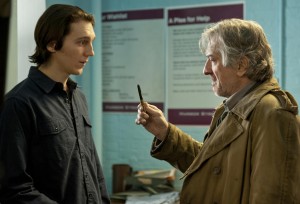BEING FLYNN: 3 STARS
 Robert De Niro’s newest film, “Being Flynn,” places him back where we first noticed him, behind the wheel of a cab in New York City.
Robert De Niro’s newest film, “Being Flynn,” places him back where we first noticed him, behind the wheel of a cab in New York City.
Based on a memoir by writer Nick Flynn, the movie is a dual narrative between its leading characters, a father and son, both wannabe writers, both with addiction problems. It begins with Jonathan Flynn (Robert De Niro), a disturbed man who says there are only three classic American writers, Mark Twain, J.D Salinger and Jonathan Flynn. That he is unpublished does not diminish his grandiose claim to greatness. From behind the wheel of his cab he’ll tell anyone who’ll listen about his masterpiece, but when as his delusions grow more intense, he loses his job, his apartment but not his conviction that he is a great writer.
Running concurrent with Jonathan’s story is his son Nick’s (Paul Dano) tale.
Nick has been drifting through life since his father left, got thrown in jail and disappeared into the ether. Taking a job at a homeless shelter seems to give him purpose–as does a relationship with Denise (Olivia Thirlby–until his father contacts him, looking for a favor, and later a bed at the homeless shelter. The presence of his father forces him to recognize that perhaps he shares more in common with his dad than he cares to admit.
“Being Flynn” is a bleak character study that scrapes by on the strength of its performances. De Niro is looser than we’ve seen him in years, getting underneath the skin of a man who is courtly one moment, deluded, racist and violent the next. It’s vibrant work, that brings humanity to a very unlikeable character.
Dano, best known for his work in “There Will Be Blood,” is properly haunted as a man plagued by memories of his mother’s death and the strained relationship with his father. Gaunt to the point of making Keith Richards look healthy, he is convincing as a man trying to find his way through a fog.
Julianne Moore has a small, but pivotal role, adding to the acting fireworks on display, but the very structure of the film–the dual story telling and an unfortunate sequence where characters comment to camera–is hard going. Add to that a story even Debbie Downer would find depressing and you have a film that rewards the viewer with performances while penalizing them with subject matter.
